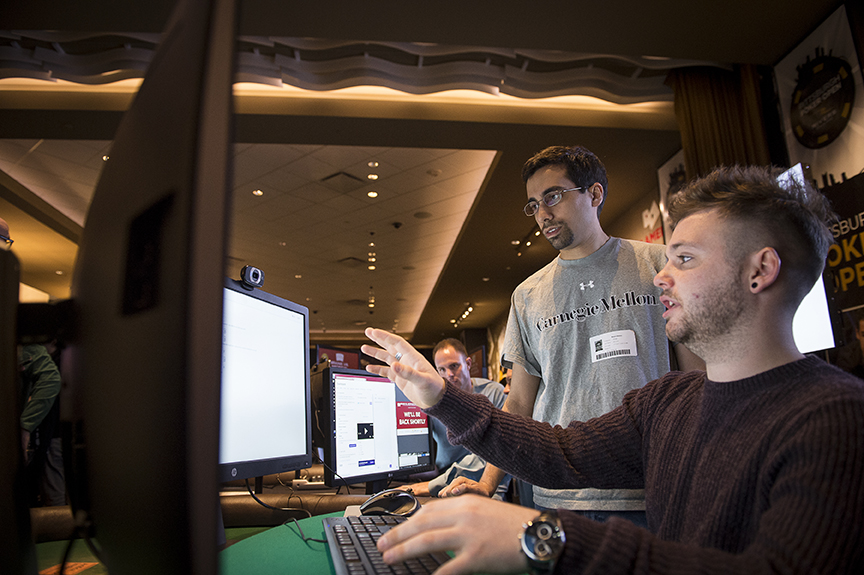CMU AI Is Tough Poker Player Libratus Builds Substantial Lead in Brains Vs. AI Competition
Byron Spice (Carnegie Mellon) and Garrett Allen (Rivers Casino)Friday, January 20, 2017Print this page.

As the "Brains vs. Artificial Intelligence: Upping the Ante" poker competition nears its halfway point, Carnegie Mellon University's AI program, Libratus, is opening a lead over its human opponents — four of the world's best professional poker players.
One of the pros, Jimmy Chou, said he and his colleagues initially underestimated Libratus, but have come to regard it as one tough player.
"The bot gets better and better every day," Chou said. "It's like a tougher version of us."
Brains vs. AI, which began Jan. 11 at Rivers Casino in Pittsburgh, pits Chou and three other leading players — Dong Kim, Jason Les and Daniel McAulay — against Libratus in a 20-day contest in which they will play 120,000 hands of Heads-Up, No-Limit Texas Hold'em poker. All four pros specialize in this two-player, unlimited bid form of Texas Hold'em and are considered among the world's top players of the game.
While the pros are fighting for humanity's pride — and shares of a $200,000 prize purse — Carnegie Mellon researchers are hoping their computer program will establish a new benchmark for artificial intelligence by besting some of the world's most talented players.
Libratus was developed by Computer Science Professor Tuomas Sandholm and his Ph.D. student, Noam Brown. Libratus is being used in this contest to play poker, an imperfect information game that requires the AI to bluff and correctly interpret misleading information to win. Ultimately programs like Libratus also could be used to negotiate business deals, set military strategy or plan a course of medical treatment — all cases that involve complicated decisions based on imperfect information.
In the first Brains vs. AI contest in 2015, four leading pros amassed more chips than the AI, called Claudico. But in the latest contest, Libratus had amassed a lead of $459,154 in chips in the 49,240 hands played by the end of Day Nine.
"I'm feeling good," Sandholm said of Libratus' chances as the competition proceeds. "The algorithms are performing great. They're better at solving strategy ahead of time, better at driving strategy during play and better at improving strategy on the fly."
Chou said he and the other pros have shared notes and tips each day, looking for weaknesses they can each exploit.
"The first couple of days, we had high hopes," Chou said. "But every time we find a weakness, it learns from us and the weakness disappears the next day."
The change from day to day is not unexpected, Sandholm said. Each night after poker play ends, the Pittsburgh Supercomputing Center's Bridges computer performs computations to sharpen the AI's strategy. During the day's game play, Bridges computes end-game strategies for each hand.
"The people at the Pittsburgh Supercomputing Center have done a great job," Sandholm said, noting the staff has moved workloads around to enable the computer to be used in the competition. Since the beginning of the contest, the center has increased the number of Bridges' computer nodes assigned to the poker tournament.
Play begins at 11 a.m. each day and ends after 8 p.m. The public is welcome to observe game play, which is in Rivers' Poker Room.
Brains vs. AI is sponsored by GreatPoint Ventures, Avenue4Analytics, TNG Technology Consulting GmbH, the journal Artificial Intelligence, Intel and Optimized Markets Inc. The School of Computer Science has partnered with Rivers Casino, the Pittsburgh Supercomputing Center through a peer-reviewed XSEDE allocation, and Sandholm's Electronic Marketplaces Laboratory for this event.
About Carnegie Mellon University:Carnegie Mellon is a private, internationally ranked research university with programs in areas ranging from science, technology and business, to public policy, the humanities and the arts. More than 13,000 students in the university's seven schools and colleges benefit from a small student-to-faculty ratio and an education characterized by its focus on creating and implementing solutions for real problems, interdisciplinary collaboration and innovation.
About the Pittsburgh Supercomputing Center: The Pittsburgh Supercomputing Center is a joint effort of Carnegie Mellon University and the University of Pittsburgh. Established in 1986, the PSC is supported by several federal agencies, the Commonwealth of Pennsylvania and private industry, and is a leading partner in XSEDE (Extreme Science and Engineering Discovery Environment), the National Science Foundation cyberinfrastructure program.
About Rivers Casino: Opened in 2009, Rivers Casino has been voted a "Best Place to Work" in the Pittsburgh Business Times, a "Top Workplace" in the Pittsburgh Post-Gazette, "Best Overall Gaming Resort" in Pennsylvania by Casino Player magazine, and "Best Overall Casino" in Pennsylvania by Strictly Slots magazine. The casino features more than 2,900 slots, 83 table games, a 30-table poker room, nine distinctive restaurants and bars, a riverside amphitheater, a multipurpose event space, live music performances, free parking, and multiple promotions and giveaways daily. Already, more than $631 million in jackpots have been awarded to players at Rivers Casino.
Byron Spice | 412-268-9068 | bspice@cs.cmu.edu
